
The Grand Canal is a channel in Venice, Italy. It forms one of the major water-traffic corridors in the city.
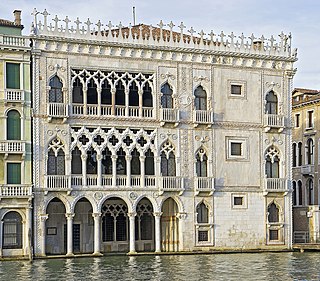
The Ca' d'Oro or Palazzo Santa Sofia is a palace on the Grand Canal in Venice, northern Italy. One of the older palaces in the city, its name means "golden house" due to the gilt and polychrome external decorations which once adorned its walls. Since 1927, it has been used as a museum, as the Galleria Giorgio Franchetti.
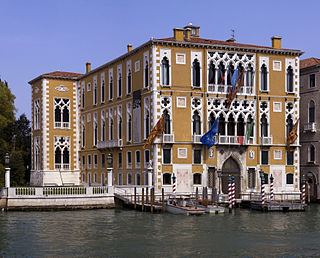
Palazzo Cavalli-Franchetti is a palace in Venice, Italy, not far from the Ponte dell'Accademia and next to the Palazzo Barbaro on the Grand Canal of Venice. Since 1999 it has been the seat of the Istituto Veneto di Scienze, Lettere ed Arti and frequently houses cultural events.

The Palazzo Dario is a palace located between the Palazzo Barbaro Wolkoff and the narrow Rio delle Torreselle on the Grand Canal in the sestiere of Dorsoduro, of the city of Venice, Italy. The palace was built in the Venetian Gothic style and was renovated in Renaissance style.

Palazzo Loredan dell'Ambasciatore is a late 15th-century Gothic palace in Venice, Italy, that once belonged to the noble Loredan family. Located in the Dorsoduro sestiere (quarter), it was called "dell'Ambasciatore" because it was offered as a home of the ambassadors of the Austrian Empire to the Republic by Doge Francesco Loredan.

The Palazzo Barbarigo Minotto is a 15th-century palace on the Grand Canal in Venice, northern Italy, next to the much larger Palazzo Corner. Built in the Venetian Gothic style, it was originally two palaces, Palazzo Barbarigo and Palazzo Minotto, later joined together. The Barbarigo palace was owned by the Barbarigo family for several centuries and was the birthplace of Gregorio Barbarigo, who once refused the Papal Crown. It was later owned by the Minotto and Martinengo families.

Palazzo Molin del Cuoridoro is a 15th-century listed building in the San Marco district of Venice, Italy.

The Palazzo Erizzo, also known as the Palazzo Erizzo a San Martino, is a palace located in the sestiere of Castello, adjacent to the south with the Palazzo Grandiben Negri, and across a Rio from the church of San Martino in Venice, Italy. A second Palazzo Erizzo alla Maddalena is located on the Grand Canal of Venice.

The Palazzo Giustinian Lolin is a Baroque style palace located on the Grand Canal of Venice, Italy. The present facade was designed circa 1630 by Baldassare Longhena. It is used as an exhibition venue for the Venice Biennale.
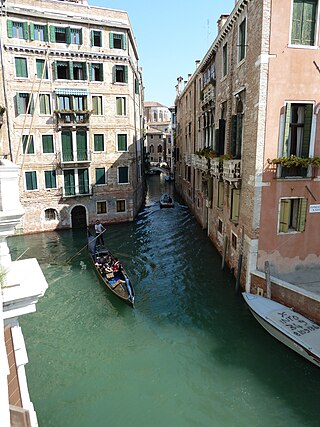
The Palazzo Donà-Ottobon is a palace located at Calle della Madonna on the Fondamenta di San Severo, corner with Calle Larga San Lorenzo, in the Sestiere of Castello in Venice, Italy. The remains of this Venetian Gothic palace are a small corner facade, alongside a canal, with two and a half walled-up gothic arcades in the piano nobile. The portal has an equally awkward marble relief of the Virgin with St Francis, St Claire de Montefalco, and a donor of reduced size. Earlier authors do not mention this portal.
Ca’ Sanudo Turloni is a Gothic-style palace located with a façade on Rio de Sant'Antonio, and located in Calle Pezzana #2162, in the Sestiere San Polo in Venice, Italy.
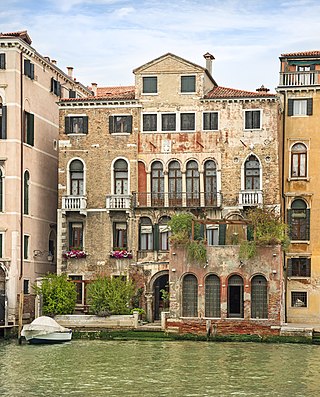
Palazzo Barzizza is a restructured formerly Gothic-style palace located on the Canal Grande of Venice, adjacent to the Palazzo Giustinian Businello in the Sestiere of San Polo, Venice, Italy. The opposite palace is Palazzo Cavalli.

The Palazzo Donà della Madoneta is a Gothic-style palace located on the Canal Grande of Venice, between Casa Sicher and Palazzo Donà a Sant'Aponal in the Sestiere of San Polo, Venice, Italy.

The Palazzo Donà a Sant'Aponal, also known as the Palazzo Donà or Palazzo Donà dalle Trezze, is a Gothic-style palace located on the Canal Grande of Venice, between Palazzo Papadopoli and Palazzo Donà della Madoneta in the Sestiere of San Polo, Venice, Italy.

The Palazzo Pisani Gritti is a Venetian Gothic palazzo located on the north side of the Grand Canal, opposite the Church of the Salute, between the Campo del Traghetto and the Rio de l'Alboro, in the Sestieri of San Marco, Venice, Italy. It was the residence of Doge Andrea Gritti in the 16th century. It is now the Gritti Palace Hotel.
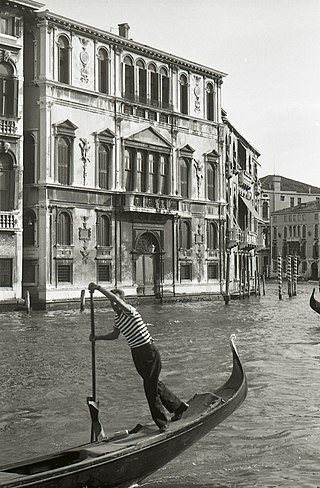
The Palazzo Contarini delle Figure is a Renaissance-style palace located between the Palazzo Mocenigo Ca' Vecchia and Palazzo Erizzo Nani Mocenigo, across the Grand Canal from the Palazzo Civran Grimani in the sestiere di San Marco in the city of Venice, Italy.

The Palazzo Bernardo a San Polo, also known as the Giustinian Bernardo is a Gothic-style palace located between Palazzo Querini Dubois and across the Rio del la Madoneta, Casa Sicher, on the Grand Canal in the sestiere of San Polo of Venice, Italy.

Palazzo Ariani, also known as Palazzo Ariani Minotto Cicogna, is a palace in Venice, located in the Dorsoduro district, almost opposite to the church of Angelo San Raffaele and not far from San Sebastiano. The nearby bridge Ponte del Soccorso connects it to the Palazzo Zenobio.
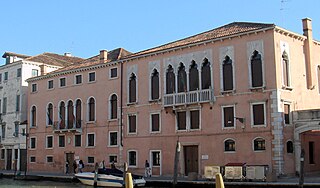
Palazzo Testa is a small Gothic palace in Venice, Italy, located in the Cannaregio district and overlooking the Canale di Cannaregio.

Palazzo Correr Contarini Zorzi is a Renaissance palace in Venice, Italy, overlooking the Grand Canal and locating in the Cannaregio district between Palazzo Querini Papozze and Palazzo Gritti. The palazzo is also known as Ca' dei Cuori, a family whose wrought iron coats of arms is present on the façade.



















